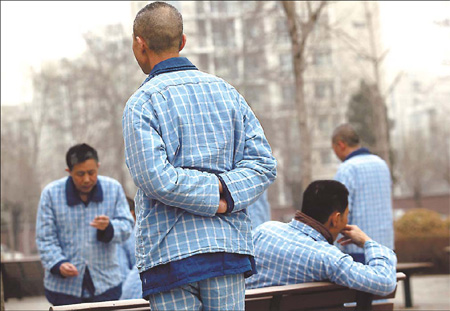Fear of people with mental illness hampers expansion
 |
|
Patients at the Huilongguan Hospital take a stroll in the courtyard. [China Daily] |
Beijing is in dire need of more rehabilitation centers for people with mental health problems but few people are ready to welcome them in their neighborhoods, says a doctor who specializes in the field.
Nan Zhenguo, from Huilongguan Hospital, said Beijing has around 10,000 patients with severe mental illness. Most hospitals able to help them are full. Nan would like to see more rehabilitation centers built so less severe cases can be reintegrated into the community. But, he says, people's fear of those with mental health issues make the building of such centers a struggle.
"A rehabilitation therapy center is much like a buffer zone for psychiatric patients," he said. "If they are unable to go back into society without further medical guidance, they would have to return to the hospitals if it were not for the help of rehabilitation centers."
As one of the largest psychiatric hospitals in Beijing, Huilongguan Hospital set up a pilot project in October 2008 to build a rehabilitation therapy center in Yuetan, Xicheng district.
Nan said people in the neighborhood were initially very concerned.
Zhang Lijun, a 65-year-old resident of Sanlihe, Xicheng district, was among them.
"I was afraid that those mental patients would hurt me unexpectedly," Xhang said. "So, I always chose other roads back home that were far from the therapy center."
Zhang said parents in the neighborhood even warned their children not to play near the institution, which was ultimately built and which is called Jingxinyuan.
Nan said the center is available for the 289 psychiatric patients in the Yuetan area and has become accepted by its neighbors, but he admits its success is largely down to the time experts spent liaising with people in the neighborhood to address their fears.
"We've made great efforts to help residents in the Yuetan area learn more about mental disease," Nan said. "With the help of doctors, the patients are as normal as ordinary people."
Nan, who is in charge of medical guidance at Jingxinyuan, said other districts desperately need such facilities but will face even more opposition because few will be able to have such a long dialogue with the neighboring community to reduce opposition.
Three months ago, the Mirror Evening News reported that Beijing Xicheng Ping An Hospital was planning to build such a center in Xizhimen. Residents protested and the project appears to have stalled.
Wards at Huilongguan Hospital, one of the main psychiatric hospitals in the city, are 90 per cent full.
Beijing's two other major psychiatric hospitals, Beijing No 6 Hospital and Beijing An Ding Hospital, are both full.
"Because some patients cannot get the professional medical care they need at home and because there is a lack of rehabilitation centers, some patients have been at the hospitals for years," said Nan.
"Both the doctors and the patients want to see more rehabilitation centers built in the city. They would help institutionalized patients return to their homes and the stress on overburdened psychiatric hospitals would be eased."
He said rehabilitation centers offer psychiatric patients the best chance of returning to a normal life and the model is widely used in Western countries.
"But in China, it is still being developed."
Jingxinyuan center has facilities to offer 12 patients therapy each day and is staffed by doctors, nurses and other staff from Huilongguan Hospital.
The center helps psychiatric patients learn the skills they need to return to normal life as well as pottery, paper-cutting and other skills that help in their communication with others.
"I want to have the chance to talk and play with others so I don't feel so isolated from society," said a patient, surnamed Wang.
 0
0 






